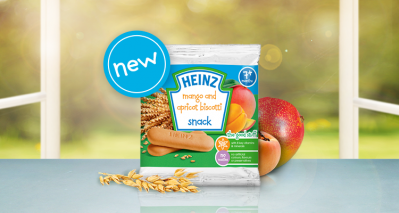Is baby food creating fussy eaters?

Look at the baby food on offer in any supermarket and there will be a wide range of flavours - winter vegetable mix or fruit salad puree, even vegetable curry.
Yet INRA researcher Sophie Nicklaus says this mix of flavours is not necessarily a good thing. Speaking in French at the Méditerranée à Déguster conference in Montpellier last week, she said: “It’s really important that children discover the taste of each vegetable individually. Children who have only eaten mixed vegetable purees will not differentiate between the flavours … meaning they won’t really like the taste of individual vegetables.”
Research from biopsychologist Marion Hetherington backs this. In a study published in Appetite Journal she found that slowly introducing babies to purees made up of one vegetable only (either carrots, green beans, spinach or broccoli) made the babies more receptive afterwards to trying (and liking) other vegetables.
“The strategy (of mixing vegetables or masking them with other flavours) probably does not allow for familiarisation with the visual, olfactory, gustatory or textural properties of vegetables.
“In other words, this approach leads to vegetable intake but not to learning to like, eat and recognize vegetables.”
She said the study supported the practice of introducing children to vegetables one at a time, a practice that is widespread in France and encouraged by health policy-makers there.
Baby food is growing up
According to Nicklaus, baby food trends or habits are culturally linked, reflecting the culinary norms of each country. In Denmark parents use raw vegetable purees; in Portugal they are mixed with olive oil.
And because baby food manufacturers clearly have to appeal to parents as well as and babies, flavours reflect adult consumer trends with exotic ingredients such as amaranth, quinoa or buckwheat.
Some baby food manufacturers are catching on to the idea that nurturing a taste for single vegetables can widen a baby’s palate later in life. Sprout Organic and Earth’s Best have a range of single veggie purees - butternut squash, carrot, green bean, and sweet potato.
These also sit alongside more elaborate combinations such as sweet potato, white beans and cinnamon, perhaps reflecting parents' desire to accustom their children to real-life flavours - not many adults sit down to a meal of pureed spinach.
Attitude matters too
Nicklaus and the researchers at the Centre des Sciences du Goût et de l'Alimentation (Centre for Taste and Food Science) in Dijon found another factor at play in fostering a wide palate - attitude. Parents who took an interest in the provenance, freshness and quality of the baby food tended to have babies who were less ‘difficult’ and more open to trying new flavours.
She said this probably stemmed from the fact that these parents focused more on the food rather than the child’s individual preferences during mealtimes – eating the food themselves, talking about the food and gently encouraging – but not insisting - that the child tries it.
Rosie Dodds, senior policy adviser at UK parenting charity NCT said this approach – giving greater freedom to the child to select food during weaning – has been confirmed both by parents and researchers.
“Anecdotally, parents say that babies who can choose what to feed themselves seem to have wider food tastes… There is evidence that a maternal feeding style that is low in control is better for the development of the child’s eating style and weight.
“[Researcher] Gill Rapley suggests that the baby-led weaning method allows babies to regulate their own food intake according to appetite and may reduce food fussiness.”
Advice
So what advice should baby food manufacturers take on board apart from developing more single vegetable products?
For Nicklaus, affordability is key – there is no point in making nutritious products if they are priced out of most parents’ range, although she recognised that there was a valid reason behind this: “Food restrictions relating to pesticides are imposed on manufacturers of baby food. These are quite different to adult food and it means that the price is often higher.”
Dodds said manufacturers should stop adding salt and sugar to baby food, and also urged them to comply with WHO advice:
“All the large-scale manufacturers still label foods ‘from 4 months’ in the UK, although I understand Marks and Spencer now have a range which starts at 6 months.
"It is unnecessarily confusing for parents and about time the EU came into line with WHO recommendations [which state] the minimum age foods should be labelled is from 6 months,” she said.
Source: Appetite Journal
First published online 18 October 2014 http://dx.doi.org/10.1016/j.appet.2014.10.014
“A step-by-step introduction to vegetables at the beginning of complementary feeding. The effects of early and repeated exposure.”
Authors: Marion M. Hetherington et al.

























